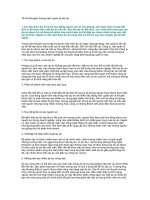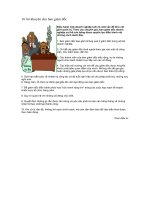10 lời khuyên cho việc học ngôn ngữ thành công
Bạn đang xem bản rút gọn của tài liệu. Xem và tải ngay bản đầy đủ của tài liệu tại đây (89.24 KB, 9 trang )
The compiler by ANH TRÌNH
10 Tips for Language Learning Success
If you're a first-time language learner, you know that emotional ups and downs come
with the territory. When you understand a concept or begin to comprehend the
language, you may experience feelings of exhilaration. However, these are often
followed by moments of frustration and discouragement, during which you might
feel as if you will never master the concepts and attain the ability to understand
and communicate effectively. Below are some time-tested, research-verified
approaches that will help mitigate potential frustration and will increase your
ability to succeed in language learning.
1. Set realistic expectations
It is natural to feel uncomfortable in a language class. You're used to being in
classes where the mode of communication -- the language of instruction -- is
a given.
In a language course, however, it is the mode of communication itself that is
the focus of instruction. For this reason, a language course is different than
most other courses you will ever take. Not understanding and making
mistakes -- things that are negative learning indicators in other courses --
are a very natural part of the language learning process. Accept the fact that
you will not understand everything. In fact, at the very beginning, you will
not understand much at all.
Remember that during the initial period of adaptation your ear and your
mind are adjusting to the sounds and the rhythm of the language. Though you
will not understand all of what is being said, you will be amazed at your
increasing ability to make sense of the language. Remember that the only way
to learn the language is through practice, practice, and more practice; in the
course of practicing you will make many errors … and you will learn from
them.
2. Break study time into smaller chunks
Research shows that language students learn more effectively and retain
more when they study frequently and for shorter periods of time than if they
study infrequently for extended periods of time. Try to study each day, and
whenever possible, several times a day. This means, for instance, doing a few
homework exercises each day rather than doing all homework assignments
the night before they are due.
The compiler by ANH TRÌNH
In addition, there are many otherwise mentally "idle" moments during the
day when you can work in some studying. For example, you can review
vocabulary while eating breakfast, recite the alphabet while showering, count
your steps as you walk between classes, name as many object as you can in
the target language on your to way school, take your vocabulary flash cards
with you on a road trip.
There are many moments during the day when you can squeeze in a few
minutes of practice time. Through the repetition of material, it will be come
increasingly familiar, until it eventually becomes an automatic part of your
language repertoire.
3. Learn vocabulary effectively
Vocabulary is the most essential element of communication. The more words
you know, the more you can say and understand.
The absolute best way to learn vocabulary is through the use of flash cards
that you make yourself. Purchase a set of 3 x 5 index cards and cut them in
half. (This makes them small enough to carry everywhere.) Write a
vocabulary word on the front and its English definition on the back. As you
learn more information about each word (e.g. plural forms of nouns,
principle parts of verbs), you can add these to the cards.
There are many ways you can use flash cards as a learning tool. To help you
learn and remember noun genders, for example, you can color code the
nouns by gender, either by using colored cards or colored ink. When
studying, organize words in meaningful groups (e.g., by noun gender, in
thematic categories, regular verbs vs. irregular verbs). Shuffle the cards or
groups, so that you use the stack(s) in a different order each time. Use the
cards in both directions: first look at the foreign language words and try to
recall the English definition. Then shuffle and look at the English definitions
and attempt to remember the foreign language words. Flash cards offer many
possibilities. Take advantage!thematic categories, regular verbs vs. irregular
verbs). Shuffle the cards or groups, so that you use the stack(s) in a different
order each time. Use the cards in both directions: first look at the foreign
language words and try to recall the English definition. Then shuffle and look
at the English definitions and attempt to remember the foreign language
words. Flash cards offer many possibilities. Take advantage!
The compiler by ANH TRÌNH
4. Practice language actively
Whenever possible, speak the language aloud rather than reciting it silently
to yourself. Say vocabulary words out loud, read passages in the text aloud,
do pronunciation activities orally and not just mentally. Write out the answers
to activities rather than gliding through them in your mind. Read aloud entire
sentences in an activity rather than just reading a fill-in response.
Transferring language from your mind to your mouth is a skill that requires a
great deal of practice.
5. Do homework conscientiously
In the course of a conversation, it is not practical to look up noun genders or
fret over verb tenses. But homework offers you a golden opportunity to
practice your language skills in a deliberate manner.
When doing your homework, you have the luxury of time. Look up words and
genders you don't know. Refer to charts and other resources available to you.
This will reinforce the material and eventually it will become automatic. If
you never look things up or simply guess, you will be strongly reinforcing
errors and you will never learn proper forms and words. Read instructor
feedback on homework and ask clarifying questions when necessary.
Maximize the utility of your homework to your learning.
6. Form study groups
Meet regularly with classmates to work together on homework assignments,
to learn vocabulary, to study for tests, or just to practice speaking the
language. Everyone has strengths and weaknesses when it comes to language
learning. Learning with others helps decrease knowledge gaps and gives you
opportunities to actively discuss concepts and material covered in class,
thereby increasing the chances that you will remember it. You will benefit
from the knowledge and abilities of your classmates, as they will from yours.
7. Identify your learning style
Each person has his/her own learning style and everyone learns at a different
pace. Try not to get frustrated if someone else in class seems to be
progressing more quickly than you. You might find that you have a knack for
grammar but have difficulty with speaking. Or you may find that you
The compiler by ANH TRÌNH
understand things perfectly in class, but when it comes to the homework
assignments, you feel lost. Strive to identify your own personal strengths and
let these help you in your learning process. If you are a visual learner, for
example, write things down and try to associate words with images. At the
same time, strive to identify your own personal learning barriers and make
efforts to overcome them. For example, if you tend to be quiet in classes and
often refrain from participating, force yourself to sit at the front of the
classroom.
8. Maximize your language exposure
If your ultimate goal is language fluency, as it is for many students learning a
language, then it is important to know that you will become more fluent more
quickly if you increase the amount of contact you have with the language. You
can start by simply practicing the language with a classmate outside of class.
You can befriend native speakers in your community or attend a local foreign
language conversation hour, if one exists. Rent a movie in the target
language, or listen to authentic audio or video online. (Many foreign
television and radio stations have streaming or archived audio and video
programs).
Remember that you won't be able to understand everything, and you might
not understand much at all at first. Nonetheless, these experiences will make
you increasingly familiar with the sounds, rhythm, and intonation of the
language. Increased exposure to and active practice with the language will
help you develop skills more quickly.
9. Spend time on task
Use the time you have in class each week to work on your language skills.
This means not only attending and paying attention in class. If you finish a
partner activity early, use the time to try conversing with your partner in the
target language on a related topic. Or work on your written homework. Or
study the weekly vocabulary. If you finish a lab activity early, attempt trying
some supplemental activities, work on the week's written homework, or
explore some cultural sites. If you are in your language class, you should be
doing something language-related. Make the most of the time you have to
maximize your learning.
10. Communicate with your instructor
The compiler by ANH TRÌNH
Take responsibility for your learning. Communicate with your instructor any
problems that may be interfering with your learning or any specific
difficulties that you are having with the material. Seek help immediately when
you need it. You might be surprised how easily such difficulties can be
resolved. Also, be proactive about making up missed work. Not only your
grade, but also your success at learning depend on it.
***There words mean:
Làm cách nào đ b t đ u h c m t ngo i ng ? Nh ng “kinh nghi m” c a ng iể ắ ầ ọ ộ ạ ữ ữ ệ ủ ườ
đi tr c trong vi c h c m t ngo i ng là gì? Li u tôi có th h c m t ngo i ngướ ệ ọ ộ ạ ữ ệ ể ọ ộ ạ ữ
đ giao ti p l u loát v i ng i b n x không?ể ế ư ớ ườ ả ứ
N u b n là ng i h c ngo i ng l n đ u tiên, b n nên bi t r ng có nhi u đi uế ạ ườ ọ ạ ữ ầ ầ ạ ế ằ ề ề
nh h ng đ n c m xúc c a b n. Khi b n hi u m t n i dung nào đó ho c b tả ưở ế ả ủ ạ ạ ể ộ ộ ặ ắ
đ u n m đ c m t ngo i ng nào đó, b n c m th y r t say mê. Tuy nhiên,ầ ắ ượ ộ ạ ữ ạ ả ấ ấ
nh ng c m giác này cũng th ng đ c ti p n i theo sau là c m giác không hàiữ ả ườ ượ ế ố ả
lòng và thi u can đ m đ h c ti p.ế ả ể ọ ế
Trong su t kho ng th i gian b n c m th y không hài lòng, b n không n m v ngố ả ờ ạ ả ấ ạ ắ ữ
ki n th c và khó có kh năng hi u và giao ti p m t cách hi u qu . D i đây làế ứ ả ể ế ộ ệ ả ướ
m t s ph ng pháp đã đ c ki m ch ng qua nghiên c u và đã đ c thộ ố ươ ượ ể ứ ứ ượ ử
nghi m s giúp b n gi m b t c m giác không hài lòng và s làm tăng kh năngệ ẽ ạ ả ớ ả ẽ ả
thành công trong vi c h c ngo i ng c a b n.ệ ọ ạ ữ ủ ạ
1/ Thi t l p nh ng c mu n th c tế ậ ữ ướ ố ự ế:
Có c m giác không tho i mái và e ng i trong l p h c ngo i ng là m t đi u h tả ả ạ ớ ọ ạ ữ ộ ề ế
s c t nhiên. Hãy nh l i nh ng c m giác đ u tiên khi b n trong nh ng l pứ ự ớ ạ ữ ả ầ ạ ở ữ ớ
h c mà ngo i ng đ c dùng nh nh ng hình th c giao ti p và h ng d n?ọ ạ ữ ượ ư ữ ứ ế ướ ẫ
Trong m t khoá h c ngo i ng , các tình hu ng giao ti p đ c di n ra nh th cộ ọ ạ ữ ố ế ượ ễ ư ự
t nh ng nh ng ch d n v các tình hu ng đó m i là tr ng tâm. Hi u theo cáchế ư ữ ỉ ẫ ề ố ớ ọ ể
này thì m t khoá h c ngo i ng khác h n so v i h u h t t t c các khoá h cộ ọ ạ ữ ơ ớ ầ ế ấ ả ọ
khác mà b n đã t ng tham gia. Không n m đ c v n đ và m c l i trong l pạ ừ ắ ượ ấ ề ắ ỗ ớ
h c đ c coi là h c t p không tích c c trong nh ng khoá h c khác – nh ng đâyọ ượ ọ ậ ự ữ ọ ư
l i là m t ph n r t t nhiên trong ti n trình h c ngo i ng . Hãy ch p nh n sạ ộ ầ ấ ự ế ọ ạ ữ ấ ậ ự
th t r ng b n s không hi u m i th . S th t là vào th i đi m b t đ u, b n sậ ằ ạ ẽ ể ọ ứ ự ậ ờ ể ắ ầ ạ ẽ
không hi u đ c gì m y c .ể ượ ấ ả
Nh r ng trong su t kho ng th i gian ban đ u, tai và tâm trí c a b n đangớ ằ ố ả ờ ầ ủ ạ
đ c đi u ch nh đ thích nghi v i âm thanh và âm đi u c a ngôn ng . Dù b nượ ề ỉ ể ớ ệ ủ ữ ạ









